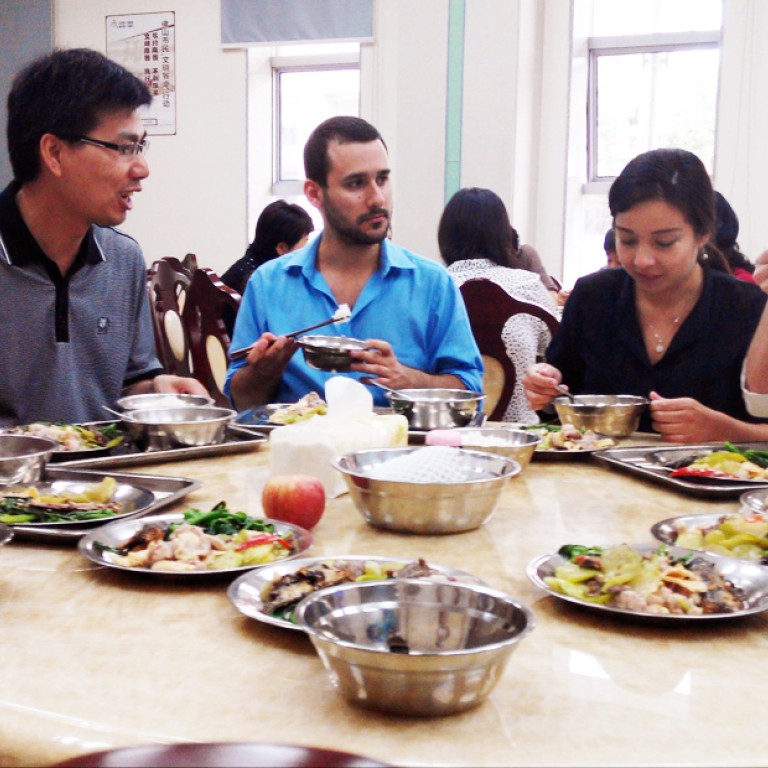
Foshan is first Chinese local government to open up to foreign talent
In a mainland first, a local government bureau has turned to overseas talent in a move hailed by Beijing as an example for others to follow
Think mainland bureaucrats and sloganeering probably comes to mind. The phrase, "Through three rivers can connect to four seas" at first baffled 26-year-old Uruguayan Nicolas Santo.
Coming to understand Chinese culture is one thing Santo will have to master as one of a group of expatriates hired by the Foshan Bureau of Foreign Trade and Economic Cooperation in a mainland first.
Santo, who has a master's degree in international law from Beijing's Tsinghua University and is a visiting fellow at Harvard Law School, has been hired as an international investment promotion consultant on a contract basis. This is the first time a mainland government department has accepted foreigners into its internal structure.
In all, five foreigners with experience in information technology and international trade will be hired. The move was applauded by the Commerce Ministry in Beijing, which listed Foshan's example as one for other local governments to follow.
There is no secret formula here. If we can do it, so can other departments
"It's the very first time a Sino-foreign team has existed in a local government structure to promote investment," Santo - who is fluent in Spanish, English, Portuguese and Italian, and commands conversational Putonghua - said. "There's the possibility of making a difference … We get to see [the local government] from the inside, how it works and get to shape it by providing recommendations."
The confusing phrase about rivers and seas appeared in the promotional material for an industrial park in Sanshui in the northwest of Foshan, which has been overshadowed by other Guangdong boom towns such as Guangzhou, Dongguan and Shenzhen.
"I get it but what does it mean? It's confusing but I can see in Chinese that it carried a significant meaning," Santo said.
"Then I later found out … that Sanshui is surrounded by a lot of rivers which makes it a great location for food and beverage industries because there are plenty of water resources around and that's why there are companies like Coca-Cola, Budweiser and Red Bull setting up manufacturing plants here. It makes sense when you connect the water resources with its implications for foreign investors."
The move to hire foreigners began early last year as Foshan was trying to forge a more international and business-friendly environment, said Zhou Zhitong , the bureau's director general.
"We began a global recruitment by advertising the positions in last August," Zhou said. Applications came from around the world, including Europe, the US, Japan, Africa, Inner Mongolia and Syria.
Also hired so far are two Britons, Abbey Heffer, 22, and Chris Blake, 32. An American with social media skills will join the Foshan Investment Promotion Agency next month, while a fifth vacancy is yet to be filled.
The team will work to promote investment opportunities to global investors and to help local businesses expand in overseas markets. They will also maintain an English-language website for the bureau, which will soon be renamed the Foshan Bureau of Commerce.
While mainland government websites are known to be difficult to navigate, the new talent is giving the bureau a stylish site. It will go live in about one month.
Multinational corporations were consulted about the recruitment and management of foreigners. "This is the first time a mainland government has ever done this so there is no previous model we can draw reference to. We weren't entirely sure how to begin," Zhou said.
Currently, they are being hired as government employees under a one-year contract with a monthly salary of about 13,000 yuan (HK$16,000) including rental allowance after deducting tax and social insurance contributions. But to them, it's not so much about the money. Heffer is a history graduate from the University of Exeter who also has majors in English literature, politics and international relations.
"You can ask anyone from top universities, no one else in the world has the same opportunities we do now," said Heffer.
Blake specialises in graphics, web design and marketing. He has worked with telecoms giant Vodafone in Australia and spent five years in Yangshuo in Guangxi before moving to Foshan 31/2 years ago.
"I have had [high-income jobs] before … but I was quite grateful there was an opportunity like this as I feel that all of my skills could be utilised," Blake said.
"[The salary] is OK. My apartment is just 1,500 yuan a month which I share with my girlfriend."
Hiring foreign staff is a human resources challenge. The Foshan bureau must meet complicated regulations while being flexible enough to attract talent. This requires officials to simplify recruitment and offer suitable pay.
The idea has drawn its fair share of criticism, with some calling officials traitors when so many domestic university graduates are jobless. Zhou believes the value of the foreign staff will be hard to evaluate at first, but is confident the move will be good for Foshan and could be rolled out to other departments. "There is no secret formula here. If we can do it, so can other departments," he said.

